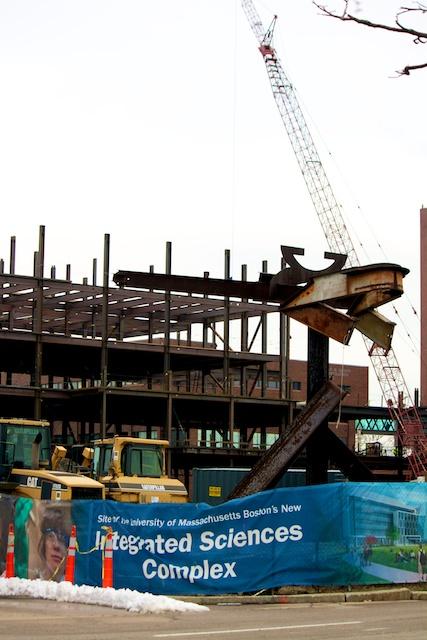As a private working citizen, you may ask yourself, “What has a public union ever done for me?” How about, for starters, weekends off, a minimum wage, the eight-hour work day and overtime compensation? Organized labor has been the most vital instrument in fighting for workers’ rights in the United States for well over a century, since the dawn of the Industrial Revolution and even before, whenever workers came together to fight against unfair labor practices.
Here at UMass Boston, the Labor Studies program and the Labor Resource Center (LRC) continue to keep the fight alive for workers. One of the oldest programs in the University, the Labor Studies Program is a part of the College of Community and Public Service. It boasts such alumni as former City Councilor Maureen Feeney, City Councilor Felix Arroyo, and State Representative Jeffrey Sanchez, among others.
Will Colon, Labor Studies student and former apprentice for the Painters Union Local 135 and 1199 SEIU (the Service Employees International Union), states, “It’s one of the richest programs in this university, because it allows you to apply theory and practice. Many students in the Labor Studies program are leaders — either stewards, presidents, treasurers, or even just organizers in their union. That allows [them] to analyze as well as learn and participate, so that [they] can effectively serve the working and middle class.”
Though worker’s unions may be out of sight to most of us, we depend on unions every day, from those who fix our roads or serve our food, to ironworkers from Local 7 who are building the Integrated Science Complex on campus right now. Through worker’s unions, employees are able to negotiate for fairer wages, better benefits like health and dental coverage, pension plans, safety on the job and other factors that are critical to ensuring a worker’s career longevity.
The Labor Studies program looks at all aspects of labor organization. Its courses, from “Workers of the World the Unite” to “The Legislative Labyrinth: Structure, Power, and Process,” focus on different aspects of labor issues. Anneta Argyres, a Program Manager with the Labor Studies Program and the LRC, says the program asks students to “think of labor studies as seeing the world through the eyes of working people and being critical of the systems through those eyes. [These skills] can benefit anybody, whether they end up in the labor movement or are employed in a non-unionized job. It lends to you, as a citizen, as a voting person, as a thinking person, understanding [about] how your government and your society works.”
Social awareness is a critical component to the Labor Studies program and the labor movement in general. Anyone who has ever worked as a laborer or service worker understands the demands required any given day on the job, and often, the realities of working conditions never make it all the way up the management chain. Argyres notes, “Part of what unions do in the workplace is say, ‘It’s not just the boss’s way. We have our own set of needs and priorities, and we want a voice at the table to put those forth and ultimately bargain over them.’”
Collective bargaining is a key tool that allows unions to reach agreements with a company’s management over how to regulate working conditions: how to make sure workers are safe, compensated and respected. This became a national focus last year when Governor Scott Walker of Wisconsin stripped collective bargaining rights from Wisconsin public workers in order to address the state’s deep budget crisis. Thousands of union supporters and demonstrators packed the halls of the Wisconsin State House demanding the right to collectively bargain. Governor Walker’s decision is still being contested in the courts, and he is currently up for an election recall.
Argyres says, “You can’t just assume the way the market works, the way our laws are currently written, is the only way it should be. You have to stop and question, ‘In whose interests are these laws written? In whose interest is our economy structured?’ And when you come to the conclusion it’s not necessarily in the vast majority of working people, then the question is, ‘How does it get formed? How is it structured? How do we change that? How do we get a voice?’”
The Labor Studies program is committed to teaching students and workers how to fight for a voice, how to negotiate, and how to think about the changing world around them. All UMass students are eligible and encouraged to take Labor Studies classes. A Certificate Program, BA, and Minor in Labor Studies are offered. To find out more about the Labor Studies Program and the Labor Resource Center, visit their department on the fourth floor of Wheatley, or visit their website: www.umb.edu/lrc.





















































